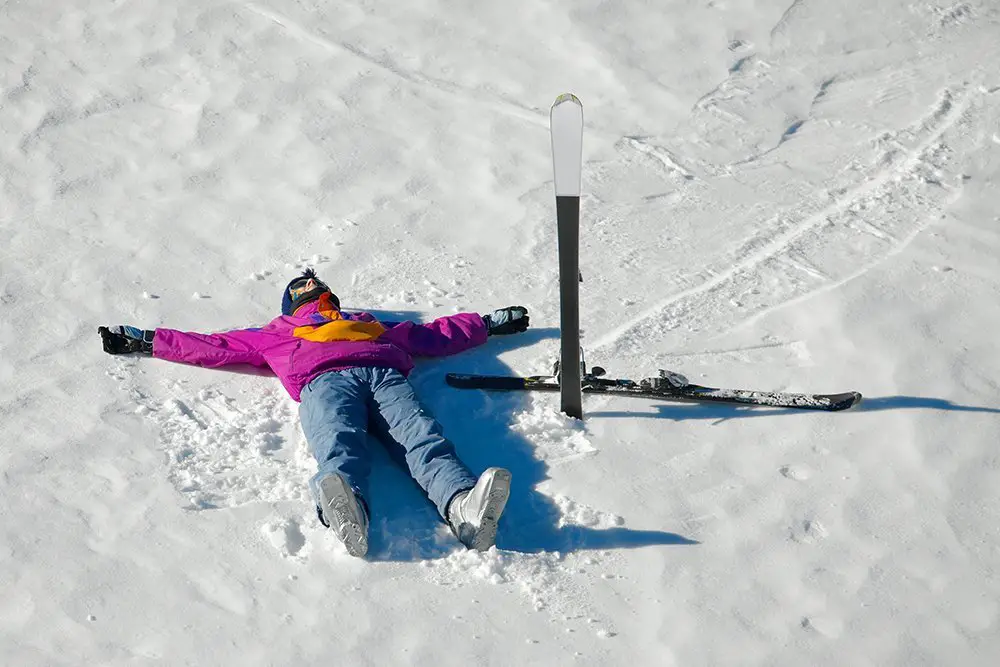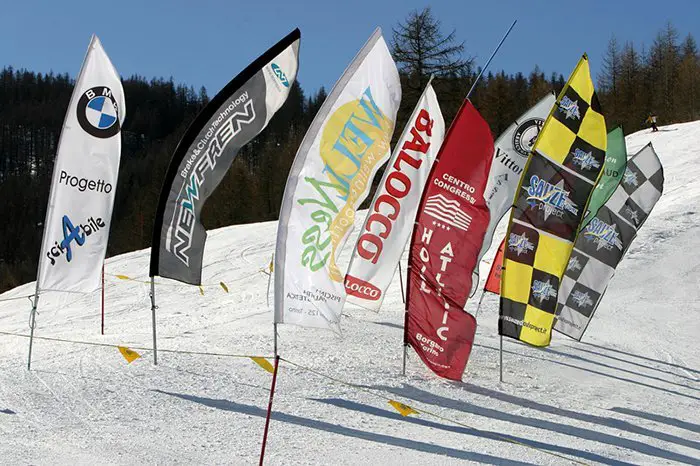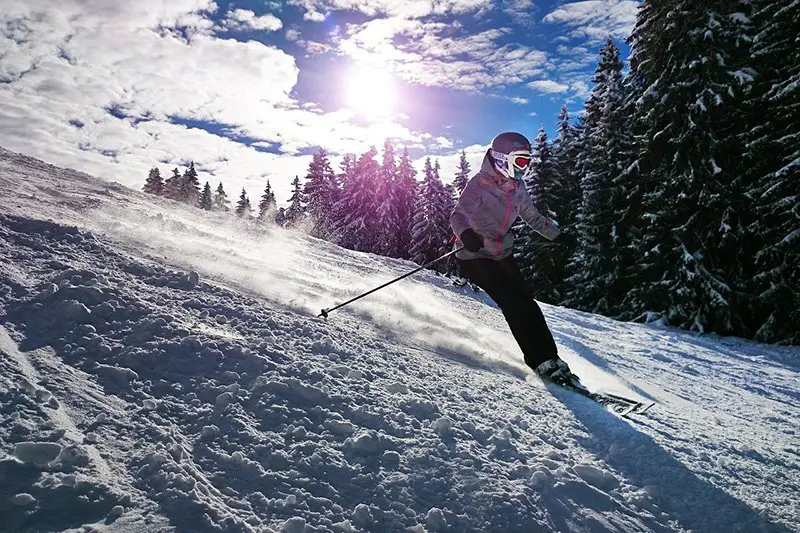Skiing is a fun and exciting sport – but it’s also challenging.
When you’re out in the snow, going as fast as you can, you have to use almost every muscle in your body to stabilize and maneuver your way into the finish line.
That’s what makes skiing so tiring: you have to use your entire body to do it. Fortunately, there’s more than one way to keep your body full of energy to ski one day and recover for the next.
In this article, I’ll explain why skiing is so tiring, how to keep your energy levels up, and how to recover after.
Table of Contents
Why we feel so tired after skiing
When you’re skiing, you use every major muscle and stabilizer in your body to make the most out of every movement. If you’ve ever been skiing, you know that much.
What you probably haven’t realized is how tiring that is. Take other sports: in soccer, you use your legs to run; in baseball, the upper part of your body is king.
When it comes to skiing, you depend on every muscle at the same time from start to finish – and that’s what makes it so tiring (and fun)!
There’s also an extra element: adrenaline. When you ski, your body is pumped full of adrenaline. Right after you finish, your body starts to go through an adrenaline dump – and that makes you exhausted.
How to ski without getting so tired
Once you understand what makes skiing so tiring, you begin to wonder how to make the most out of every skiing session. If you want to ski without getting tired, you need to eat right, ski right, and sleep right.
That’s right! All three elements are equally important to ski today and not feel like you can’t get out of bed tomorrow.
Eating right
This means having a big breakfast and a mighty lunch before you ski. If you’re going to go skiing right after breakfast, you may want to pack extra food to munch while you’re having fun.
Skiing right
Skiing correctly means doing the right movements at the right time. The better you get, the less energy you’ll use when you ski. There are only two ways to get better: skiing more and getting skiing lessons.
Sleeping right
Sleep is super important. Enjoying a good’s night sleep after you ski will ensure you packed full of energy throughout your next day of skiing. Sure, having fun is great – but if you’re going to party all night, don’t act like you should have energy the morning after.
Best ways to keep energy levels up

There are plenty of ways to keep your energy levels up while you’re skiing. They are all centered on treating skiing as a sport, one where you have to warm up, train properly, cool down, and get ready for every season.
1. Fuel your body
Food is fuel, eating healthy things like fruit, vegetables and protein packed foods before, during, and after are skiing session is the best way to maintain high energy levels throughout the day.
2. Warm-up and cool down:
Before you think about skiing, you need to do a little warm-up. What you do is up to you, as long as you hit the key areas and muscles you’re going to use; mainly, you want to target your core, legs, and lower back (planks, leg lifts, and good mornings will do the trick). When it’s time to cool down, walk around for five to ten minutes before sitting or lying down.
3. Start small before you go big:
Similar to having to warm up before you ski, you need to work your way into skiing for real. That’s right: warming up isn’t enough; you have to ease yourself into skiing too. Do a few runs around the green before you hit the mountain. Although you have warmed up, there are certain tendons and muscles you need to fire (that you won’t be able to target with a simple warm-up) before you do anything major.
4. Rely on efficiency:
Once you’re doing what you love, always pay attention to the quality of your movement and your decision-making process. You have a certain amount of energy – and depleting it right away isn’t a good idea! The best way to preserve energy is to be efficient.
5. Don’t overdo it:
As you now know, you have a certain amount of energy – but it’s not all for skiing. After you’re done, you still have to carry on with your day. So, overdoing it up to the point you can’t move afterward isn’t the right choice. Always leave a bit in the tank to function until you get to bed.
6. Get stronger:
Getting stronger is key to have more energy throughout the day. The stronger your muscles are, the easier it’ll be for you to ski. Of course, the idea here is not to hit the gym before you ski – but to do so before the skiing season.
7. Prepare for the skiing season:
The last and most important point is this: don’t forget about training as soon as winter is over. The best way to make the most out of skiing is to prepare for it throughout the year. While the gym isn’t as fun as skiing, hitting the gym will make skiing more fun when the time comes.
How to recover and feel good for your next day of skiing
After a day well-spent skiing, you’re probably a little sore and tired – but that doesn’t mean you won’t ski tomorrow!
If you take the recovery phase seriously by stretching, foam rolling, and resting, you’ll be ready to go at it again in less than 24 hours.
Stretch and foam roll
Once you’re done skiing, you need to take a moment or two to cool down. After that, you need to stretch.
Stretching is important! It takes ten minutes to do, and it’ll help you prevent injuries that may take months to heal.
Even though stretching is important, there’s something even better that you can do to prevent injuries: foam rolling. You need to break the knots and trigger points in your muscles.
If you don’t feel like foam rolling, you can get a massage. Doing so will take the soreness out of your muscles!
Use heat to improve your recovery
While stretching and foam rolling is a key aspect of recovery, using heat can also benefit you greatly.
There are multiple ways for you to heat your muscles: taking a hot bath, going to the sauna, and using a heating pad.
Applying heat allows your muscles to relax and improves blood flow and circulation. That’s more than enough to take care of soreness and improve your energy.
On the other hand, if you felt like something aches (and heat isn’t helping), you can try to apply cold to the troubled area.
Have plenty of food and water
It goes without saying that hydration and nutrition are important, even more so if you’re doing something as demanding as skiing.
So, make sure your diet is as good as it can be.
Drinking plenty of fluids (and avoiding bad ones) is fundamental for recovery. Water is always a must – in the same way that not drinking too much alcohol is a must as well.
Coffee is somewhat controversial: a little helps, and too much of it will prevent you from resting the way you’re supposed to.
Make sure you’re eating plenty of carbs, protein, and fat from good sources: fruit, meat, eggs, and all that good stuff. It’s literal fuel for your body – fuel that you need to have plenty of energy to ski!
Get your eight hours of sleep
No matter how young or old you’re, you need to sleep 7 to 9 hours per day, every day. That’s what keeps your body in shape (other than training and eating right).
Even if you’re doing everything perfectly (warming up, cooling down, stretching, getting massages every day, and have the perfect diet), if you’re not sleeping right, you’re not going to have energy tomorrow.
Not only that, but sleeping the right amount of time isn’t enough either. Quality sleep is a must as well. To make that happen, you need to sleep in a dark, silent place – and do so for eight hours on average.
Skip a day if necessary
Everyone has off days – and you will get one too sooner or later. When that day comes, you need to rest. No food, nap, massage, or tool will help you come out of an off day.
So, listen to your body. That’s a great way to prevent injuries and have energy tomorrow.
All in all, do everything right – and rest if things go wrong. That way, you’ll be full of energy tomorrow.
Conclusion
Doing everything on this list could seem like a chore, but it’s the best way to prepare yourself to ski – and continue to do so full of energy and injury-free.
To sum it up, you have to: eat, ski, and sleep right; warm up and cool down before each ski session; try not to overdo it, and if you have an off day, use it to rest.
If your muscles are more sore than usual, it’s nothing that a little heat, massage, and stretching session won’t fix.
References:
https://healthcare.utah.edu/the-scope/shows.php?shows=0_7m18zo0t
https://www.skimag.com/performance/fitness/recovery-exercises-for-skiers/



